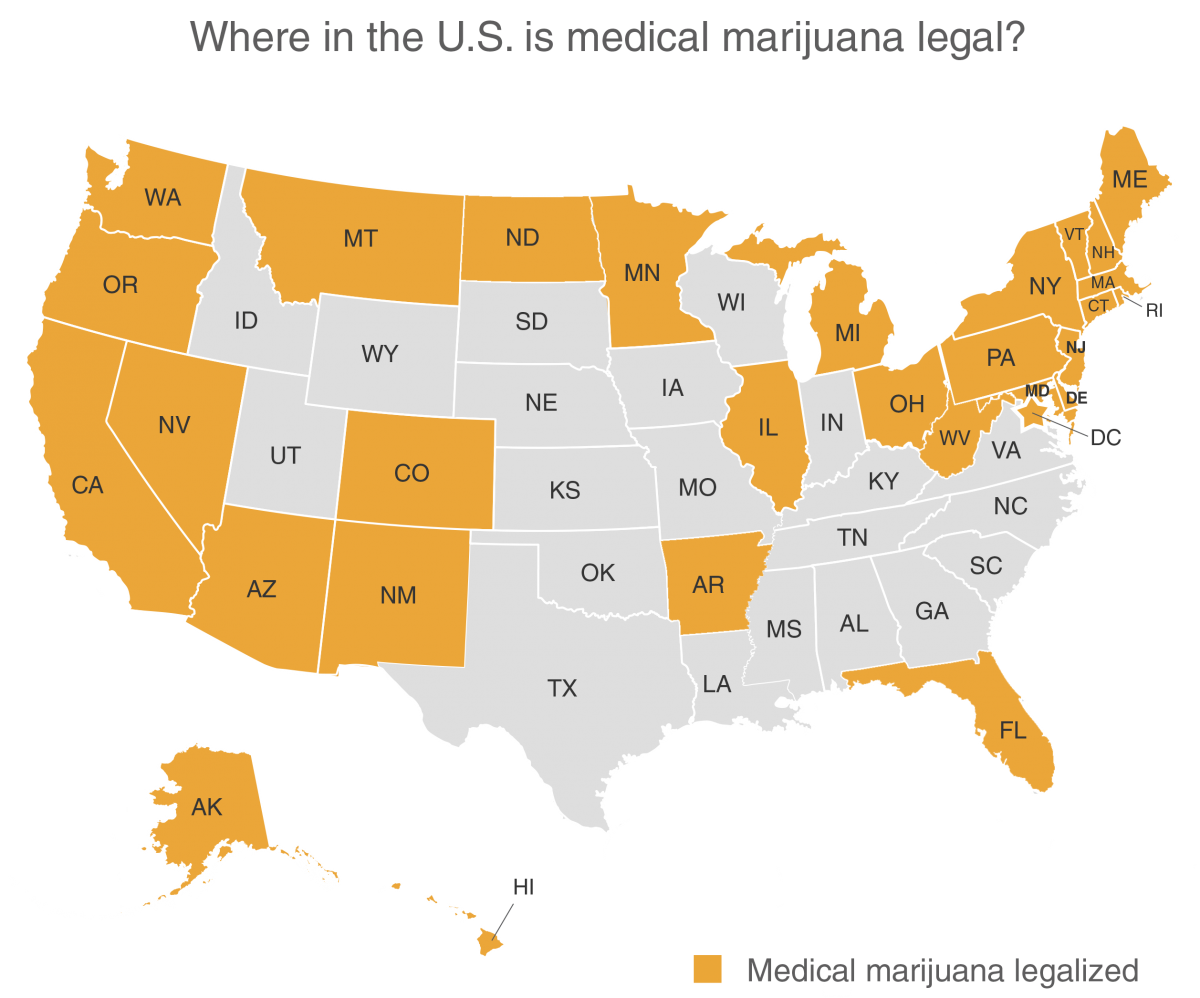The Challenging New Frontier of Marijuana IP
Alt Legal Team | November 13, 2017
Marijuana + Trademarks
The relationship between trademark law and cannabis is complicated. Cannabis is now legal for recreational or medicinal use in 28 states, but it is still classified as a Schedule I drug (read: illegal) under federal law. The US Patent and Trademark Office will not register a trademark for use in connection with goods and services that are illegal under federal law, so cannabis retailers cannot register federal trademarks for many of their goods and services.
Choosing to consume and/or sell marijuana entails some risks while the legal landscape is in flux. But for cannabis businesses in the states where the substance is legal, they have the opportunity to establish a legit business with growing revenue opportunities. So how can they protect their brands?

For most cannabis businesses, a combination of state trademark rights and a system sometimes referred to as “trademark laundering” can help them secure rights in their brand names. However, California is one state that is paving the way for cannabis-related state trademark rights. Assembly Bill 64, modeled after similar bills in Colorado and Washington, was proposed to allow the state to grant those rights.
In 2010, the USPTO created, momentarily, a new category of goods and services for marijuana products, an “international class” for “processed plant matter for medicinal purposes, namely medical marijuana.” While a couple of individuals managed to apply during that time frame, the USPTO quickly eliminated the classification, denying incoming applications because of the brands’ ties to an illegal substance.
Getting Protection
Historically, the Trademark Trial and Appeal Board (TTAB) has held that the Lanham Act’s “use of commerce” for a registration of a trademark also requires that it be “lawful use in commerce.” The Lawful Use Rule, codified in TMEP §907, arose from a series of TTAB decisions that determined trademark rights must be used in commerce that “may be lawfully regulated by Congress.” While subsequent decisions further reinforced this idea and it continues to be enforced today, Congress has the ability to regulate both lawful and unlawful commerce, which suggests the real reasoning behind the rule is avoiding dissonance. If a mark was approved for the sale of something illegal, this would feel counterintuitive. You can find a great article expanding on this history here.
Companies and trademark attorneys, especially those not in states that have cemented state trademark rights, have found an alternate means of protection through ancillary goods: the aforementioned “trademark laundering.” This process entails seeking protection not for the goods and services directly connected to the production and sale of cannabis but for other goods, like t-shirts, pipes, or advocacy materials, that the business may produce or sell.
This process allows the cannabis businesses to have some form of protection for their brands, even if it is incomplete. They may also try a variety of strategies, like producing chocolates that both do and do not contain cannabis and securing a trademark registration for the non-cannabis varieties. The hope is that if or when marijuana becomes legalized on a federal level, these companies will have some sort of a head start on maintaining their brand.
However, TTAB has stated that this is not a foolproof means of evading refusal. In the case of In re Morgan Brown, the board held that the halo effect will not provide protection for cannabis products.
If legalization does occur, this will create some problems for a variety of cannabis brands that trade on popular brand names for their strain names. A recent case, involving Gorilla Glue, led to a lawsuit. Some other strain names that may cause problems in the future include Zkittlez, Skywalker OG, Berry White, and Diet Sprite.
Marijuana + Patents
While trademark rights are currently a bit muddled, patent protection for cannabis businesses is a bit more straightforward. There is no similar provision in patent law dictating that a patent cannot be issued for a substance that is considered illegal under federal law. The USPTO began issuing cannabis-related patents in 1942, and almost 1,500 have been filed since that time, with about 500 still active. Despite the Schedule I classification, the US Department of Health and Human Services owns at least one of those patents (No. 6630507).
That particular patent, filed by the National Institutes of Health and awarded to the Department of Health and Human Services, is interesting because under US federal law, marijuana is not defined as having a medical use. The government defines Schedule I substances as “drugs with no currently accepted medical use and a high potential for abuse.” For example, Heroin is a Schedule I drug. This is interesting because the patent that the government has covers the use of cannabinoids to treat a range of diseases.
Another common trajectory for seeking patent protection is attempting to protect the cannabis plants, either with a utility patent or a plant patent. Currently, there are roughly 5 US plant patent cases (pending and issued) and 11 utility plant patent cases (pending and issued). If a cannabis company is interested in seeking protection there are several areas they might wish to consider:
(1) cannabis compositions, drug formulations, and methods of preparation, (2) characterization of cannabis compounds in terms of how they engage with human endocannabinoid receptors, and (3) methods of treating diseases with cannabinoids. (4) specific cannabinoid and terpene profiles and formulations that have more efficient biological availability for use in beverages, foods, and medicine, and (5) industrial scale fermentation approaches to production (i.e., not plant-based) that can potentially deliver specific, quality-assured cannabinoid profiles.
The patents that have already been issued have a variety of purposes. Check out a few of the patents here (cancer treatment), here (patch with transdermal delivery), and here (extract creation). One particularly interesting case is that of Kannalife Sciences Inc., who received an exclusive license from NIH to utilize part of the technology detailed in their patent to work on treatment for hepatic encephalopathy and chronic traumatic encephalopathy, better known at CTE, the disease that is plaguing the NFL.
While patent protection may be more straightforward for cannabis businesses, individuals within the industry aren’t necessarily put at ease. GQ wrote an in depth article about monopolies that are forming in the marijuana industry. This quote sums it up: “Utility patents are big. Scary.”
What about Ethics?
Along with potential obstacles to obtaining trademark and patent rights, attorneys entering the space will have some additional ethical obligations. Model Rule 1.2(d) holds that an attorney “cannot counsel a client to engage, or assist a client, in conduct that the lawyer knows is criminal or fraudulent.” While some states have legalized cannabis for recreational or medicinal uses, few states have addressed the impact the discrepancy between state and federal legality would have on ethical obligations. The Colorado Bar Association has addressed this head-on in a comment to their ethics rules that states that a lawyer may advise “a client regarding the validity, scope, and meaning of Colorado [law],” but they must also “advise the client regarding related federal law and policy.”
A Growing Industry
Despite these hurdles, IP attorneys might want to pay more attention to cannabis-related businesses, particularly if they live in a state where marijuana is legal. Why? The industry has shown some promising trends. For example, according to Newsweek, women are joining the cannabis industry at a rate that could make it the first billion-dollar industry not dominated by men. The percentage of women holding executive positions in the industry has declined in recent years but still is above the national average, 26.9% compared to 23% nationally. Women also own or have founded 26% of all cannabis businesses, compared to the 20% national average.
Based on a survey conducted by Marijuana Business Daily, 19% of respondents who owned or had an ownership stake in a cannabis business are racial minorities. While this has been cited as higher than anticipated, it falls on the lower end of estimates of the national average, which range between 18% and 29% for minority ownership. This statistic highlights room for improvement.
And in general, business is booming. In 2016, marijuana sales in North America grew by 30%, reaching $6.7 billion. It is estimated that by 2021 sales will reach $20.2 billion. Another source projects $13.3 billion in medical sales and $11.2 billion in recreational sales in 2020. Small time entrepreneurs aren’t the only players in the game either. The company behind Modelo, Corona, and Svedka just announced they are taking a 9.9% minority stake in a $2 billion Canadian medical marijuana company.

Roughly 42% of cannabis business owners anticipate expanding into new markets as well. This kind of growth is on par with cable television in the 1990s and broadband internet in the 2000s. Over $150 million has been invested in 160 ventures by one investment group alone. By 2020, the legal cannabis market will create more than a quarter of a million jobs, which is estimated to top manufacturing jobs. For every business breaking into the space in states where cannabis is legal or will be in the future, there is an opportunity for an IP attorney.
If you are interested in learning more about cannabis related trademarks, including some of the problems they face, check out our podcast episode on the topic.